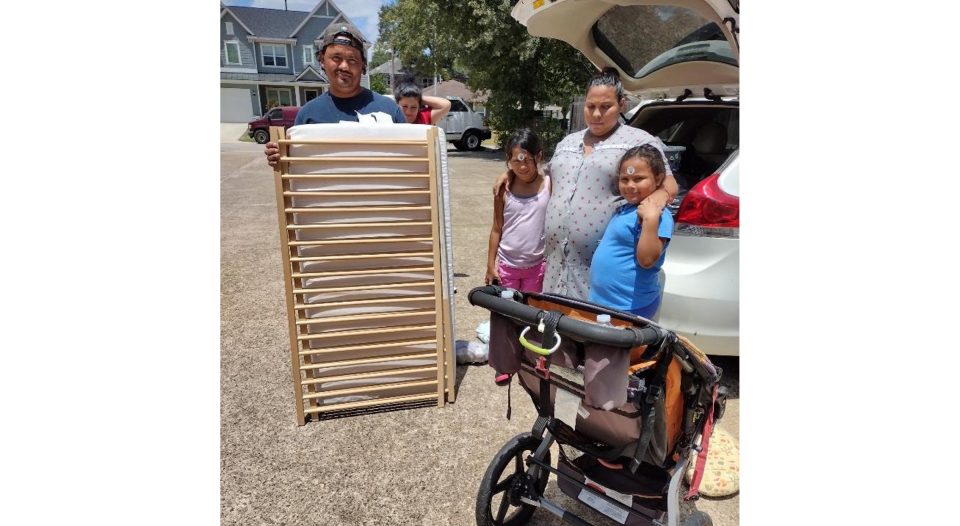While Karina was shoulders deep in a river in the Darién Gap, crossing between Colombia and Panama, her main thought was whether she, her 6-year-old son and her 18-year-old daughter would make it safely to the other side. The idea of reaching the U.S. border or being allowed into the United States seemed increasingly unlikely.
There were many reasons that would force a mother like Karina (last name withheld) to take her children and leave Venezuela. Among them is a dire economic situation that made it a continuous struggle to provide necessities for her family, including essential medical treatment. In addition to the emotional hardship of leaving loved ones behind and the considerable expenses associated with such a perilous journey, Karina and her children, like every migrant family, had to grapple with a paralyzing fear of the unknown.
Little did Karina know that, within a few months of arriving in the United States, she would emerge as a leader in a bilingual church in Richfield, Minn. Nor was she aware that, after enduring six years of debilitating migraines without access to necessary medical care in Venezuela, she would undergo surgery 30 days after her arrival that would successfully treat an aneurysm.
Soon after Karina’s arrival she began looking for places to learn English and discovered an English as a second language class offered by Tapestry Church in Richfield. At this ELCA church, she and her family were warmly welcomed by a caring community.
Tapestry represents the spirit of community-driven support for migrants, an effort that reflects a goal of the ELCA’s AMMPARO strategy to accompany migrants with protection, advocacy, representation and opportunities. This congregation not only helps sponsor migrants but also connects with other local churches and community organizations to create a network of support. The collaborative events coordinated by Tapestry demonstrate the vital role of community engagement in holistic migrant accompaniment.
AMMPARO’s story shows how a church can organize to walk alongside those who were forced to leave their homes and go on a dangerous journey in search of a better future.
In Texas, St. James Santiago Apostol Church in Houston opens its doors to migrant arrivals through its Family Life Center. The congregation has a comprehensive ministry that provides a wide range of services, including food distribution, financial support, assistance with school enrollment, community resource events and access to health care. They observe the needs of the migrant families and try to mobilize their network of community members and organizations to meet those needs.
A different tale of hospitality unfolded in Chicago. Due to busing from Texas, more than 13,000 migrants have arrived in Chicago since August 2022—many with no place to go. Many of these migrant families, desperate and exhausted, found themselves sleeping on the cold floors of Chicago police stations. Since the system failed to provide a decent and humane process for the arriving migrants, the community had to step up.
Several faith-based groups and congregations in Chicago looked for ways to find suitable places for the families to stay. Among them was Christ Lutheran Church in Albany Park. Its pastor, Tom Terrell, contacted congregation council members as soon as he learned about the families staying at the police station. Before the end of the day, he had unanimous approval from the council to open the church doors and welcome as many families as possible. In May, Christ Lutheran was able to provide five families (four from Venezuela and one from Honduras) with a decent and safe place to stay. Such an initiative is not new to the church, as Terrell explained: “Taking in people is something we’ve always done.”
But the stories of hospitality aren’t limited to individual congregations. Several ELCA synods have been holding AMMPARO close to heart. Among them is the Southeastern Minnesota Synod, whose Global Ministry and AMMPARO team has dedicated great efforts to motivate and prepare congregations in several ways. Their strategy includes border immersion experiences, interactive migrant journeys, forums and book studies as part of the educational component, in addition to advocacy initiatives and sponsorship programs. These thought-out efforts have driven congregations to actively engage in sponsoring asylum-seekers.
An expanded response
AMMPARO’s journey has not been without challenges. Though legal complexities, shifting political landscapes and resource limitations have posed obstacles, the AMMPARO strategy has evolved along the lines of building alliances and raising awareness, which facilitated growth and increased resilience. In a few short years the AMMPARO strategy has grown from focusing on Central America, Mexico and the United States to articulating strong partnerships in nine countries and a network throughout the Americas. The ELCA has long supported international companions doing global migration work. Now with AMMPARO Global connecting to this work, new networking opportunities become possible.
One key example of accompaniment of migrants in the Middle East and North Africa is St. Andrew’s Refugee Service in Cairo, Egypt (StARS for short), a ministry supported by ELCA World Hunger for many years. The refugee-led program serves 45,000 people yearly, principally from Africa but also the Middle East. This includes 7,000 to 8,000 unaccompanied children who now have access to educational, medical, psychological and legal services that will help them adjust to a new society.
AMMPARO’s story shows how a church can organize to walk alongside those who were forced to leave their homes and go on a dangerous journey in search of a better future. Rooted in faith and community collaboration, AMMPARO stands for a welcoming world for migrants. It is a reminder that, no matter how daunting the journey can be, kindness and hospitality can make the future less frightening for migrants.





